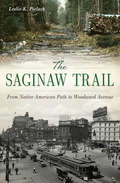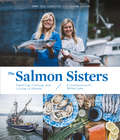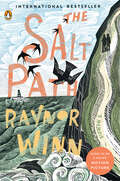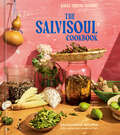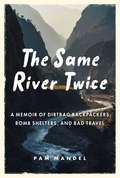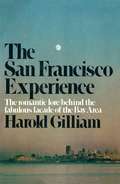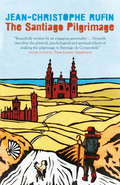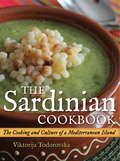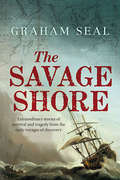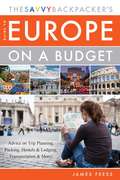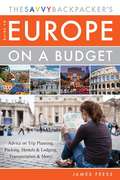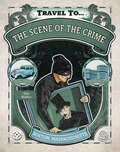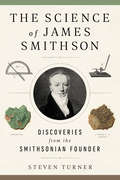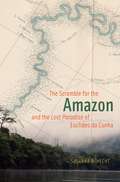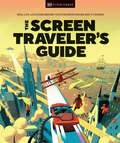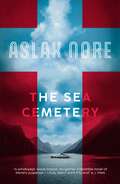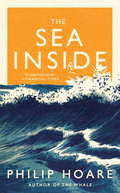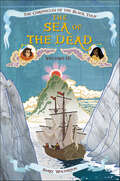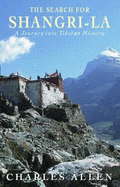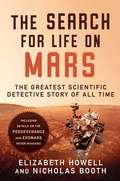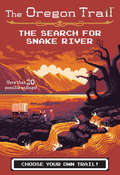- Table View
- List View
The Saginaw Trail: From Native American Path to Woodward Avenue (Landmarks)
by Leslie K. PielackThe Saginaw Trail led from the frontier town of Detroit into the wilderness, weaving through towering trees and swamps to distant Native American villages. Presenting a forbidding landscape that was also a settlers' paradise, the road promised great riches in natural resources like lumber and agriculture, and a future of wheeled vehicles that would make Michigan the center of a global industry. Leslie Pielack tells the story of the ancient path that transformed early Michigan and of the people whose lives intertwined with the iconic road.
The Sainte-Chapelle and the Construction of Sacral Monarchy
by Meredith CohenThis book offers a novel perspective on one of the most important monuments of French Gothic architecture, the Sainte-Chapelle, constructed in Paris by King Louis IX of France between 1239 and 1248 especially to hold and to celebrate Christ's Crown of Thorns. Meredith Cohen argues that the chapel's architecture, decoration, and use conveyed the notion of sacral kingship to its audience in Paris and in greater Europe, thereby implicitly elevating the French king to the level of suzerain, and establishing an early visual precedent for the political theories of royal sovereignty and French absolutism. By setting the chapel within its broader urban and royal contexts, this book offers new insight into royal representation and the rise of Paris as a political and cultural capital in the thirteenth century.
The Salmon Sisters: Feasting, Fishing, and Living in Alaska
by Emma Teal Laukitis Claire NeatonThe bright and inspiring life and work story from a pair of sisters who are Alaskan fisherwomen, along with fifty hearty and comforting recipes that honor wild foods from the sea and the shore.Share in the remarkable and wild lives of Emma Teal Laukitis and Claire Neaton, the Salmon Sisters, who grew up on a homestead in the Aleutians where the family ran a commercial fishing boat in the Alaskan sea. Their book reveals this outward-bound lifestyle of natural bounty, the honest work on a boat's deck, and the wholesome food that comes from local waters and land. Here are creative and simple ways to enjoy wild salmon, halibut, and spot prawns. The sisters are committed to sustaining and celebrating the seafaring community in Alaska, and their business of selling products related to and from the ocean donates a can of wild-caught fish to local food banks for each item purchased.
The Salt Path: A Memoir
by Raynor WinnSHORTLISTED FOR THE COSTA BOOK AWARDThe true story of a couple who lost everything and embarked on a transformative journey walking the South West Coast Path in England Just days after Raynor Winn learns that Moth, her husband of thirty-two years, is terminally ill, their house and farm are taken away, along with their livelihood. With nothing left and little time, they make the brave and impulsive decision to walk the 630 miles of the sea-swept South West Coast Path, from Somerset to Dorset, through Devon and Cornwall. Carrying only the essentials for survival on their backs, they live wild in the ancient, weathered landscape of cliffs, sea, and sky. Yet through every step, every encounter, and every test along the way, their walk becomes a remarkable and life-affirming journey. Powerfully written and unflinchingly honest, The Salt Path is ultimately a portrayal of home—how it can be lost, rebuilt, and rediscovered in the most unexpected ways.
The SalviSoul Cookbook: Salvadoran Recipes and the Women Who Preserve Them
by Karla Tatiana VasquezA beautifully photographed cookbook that celebrates the vibrant culture and community of El Salvador through 80 recipes and stories from twenty-five Salvadoran women.&“A heartfelt tribute to heritage, a testament to the power of storytelling, and an invitation to savor the true essence of El Salvador, one delicious recipe at a time.&”—Hawa Hassan, James Beard Award–winning author of In Bibi&’s KitchenIn search of the recipes and traditions that made her feel at home, food historian and Salvadoran Karla Tatiana Vasquez took to the internet to find the dishes her mom made throughout her childhood. But when she couldn't find any, she decided to take matters into her own hands. What started as a desire to document recipes turned into sharing the joys, histories, and tribulations of the women in her life.In this collection of eighty recipes, Karla shares her conversations with moms, aunts, grandmothers, and friends to preserve their histories so that they do not go unheard. Here are recipes for Rellenos de Papa from Patricia, who remembers the Los Angeles earthquakes of the 1980s for more reasons than just fear; Flor de Izote con Huevos Revueltos, a favorite of Karla's father; as well as variations on the beloved Salvadoran Pupusa, a thick masa tortilla stuffed with different combinations of pork, cheese, and beans. Though their stories vary, the women have a shared experience of what it was like in El Salvador before the war, and what life was like as Salvadoran women surviving in their new home in the United States.
The Same River Twice: A Memoir of Dirtbag Backpackers, Bomb Shelters, and Bad Travel
by Pam MandelAcclaimed travel writer Pam Mandel's thrilling account of a life-defining journey from the California suburbs to Israel to the Himalayan peaks and back. Given the choice, Pam Mandel would say no and stay home. It was getting her nowhere, so she decided to say yes. Yes to hard work and hitch-hiking, to mean boyfriends and dirty travel, to unfolding the map and walking to its edges. Yes to unknown countries, night shifts, language lessons, bad decisions, to anything to make her feel real, visible, alive. A product of beige California suburbs, Mandel was overlooked and unexceptional. When her father ships her off on a youth group tour of Israel, he inadvertently catapults his seventeen-year-old daughter into a world of angry European backpackers, seize-the-day Israelis, and the fall out of cold war-era politics. Border violence hadn't been on the birthright tour agenda. But then neither had domestic violence, going broke, getting wasted, getting sick, or getting lost. With no guidance and no particular plan, utterly unprepared for what lies ahead, Mandel says yes to everything and everyone, embarking on an adventure across three continents and thousands of miles, from a cold water London flat to rural Pakistan, from the Nile River Delta to the snowy peaks of Ladakh and finally, back home to California, determined to shape a life that is truly hers. An extraordinary memoir of going away and growing up, The Same River Twice follows Mandel's tangled journey and shows how travel teaches and changes us, even while it helps us become exactly who we have been all along.
The Samurai's Garden
by Gail TsukiyamaRecovering from tuberculosis, Stephen Chan spends a year (1937-1938) in the remote Japanese village of Tarumi. There he forms a close friendship with Matsu, the caretaker of the cottage where he is living. As Matsu's story unfolds, Stephen's life becomes entwined with the lives of the lepers in the nearby lepers' colony of Yamaguchi. In the background but always looming is the Japanese invasion of China, Stephen's homeland.
The San Francisco Experience: The Romantic Love Behind the Fabulous Facade of the Bay Area
by Harold GilliamA guide to San Francisco.
The Santiago Pilgrimage: Walking the Immortal Way
by Jean-Christophe Rufin"Whenever I was asked: 'Why did you go to Santiago?', I had a hard time answering. How could I explain to those who had not done it that the way has the effect - if not the virtue - to make you forget all reasons that led you to become involved in it in the first place."Each year, tens of thousands of backpackers (Christian pilgrims and many others) set out from either their front doorstep or from popular starting points across Europe, to Santiago de Compostela. Most travel by foot, others ride a bicycle, and a few of them travel as did some of their medieval counterparts, on horseback or with a donkey. In addition to those who undertake a religious pilgrimage, the majority are hikers who walk the way for non-religious reasons: travel, sport, or simply the challenge of spending weeks walking in a foreign land. Also, many consider the experience as a spiritual adventure, with a view to removing themselves from the bustle of modern life. Jean-Christophe Rufin followed this "Northern Way" to Santiago de Compostela by foot, on over eight hundred kilometers. Much less crowded than the usual pilgrimage route, this one runs along the Basque and Cantabrian coasts in Spain and through the wild mountains of Asturias and Galicia.Translated from the French by Malcolm Imrie and Martina Dervis
The Sardinian Cookbook: The Cooking and Culture of a Mediterranean Island
by Viktorija TodorovskaThe author of The Puglian Cookbook heads to the Italian island of Sardinia for a unique twist on the Mediterranean diet. Sardinia, the isolated and majestic island off the southwest coast of Italy, has a rich and ancient history as home to different Mediterranean peoples whose customs have intertwined over the centuries. The result is an unparalleled richness of cuisine. The Sardinian Cookbook captures these wonderful flavors, delivering more than 100 easy-to-make recipes that are as healthful as they are delicious. Sardinia is an island of many distinct landscapes and nationalities, from its rugged interior and breathtaking coastline to its diverse blend of Spanish, French, Italian, and Moorish cultures. From myrtle, saffron, and honey to lamb, seafood, and specialty cheeses, Sardinian food features a broad variety of flavors for any occasion. Many traditional Sardinian recipes are simple and straightforward—reflecting the peasant cuisine heavy on legumes, fresh vegetables, olive oil, and bread. However, it is common for Sardinians to celebrate holidays with lavish feasts and special delicacies: suckling pig, lobster, bottarga (Sardinian caviar), and the full-bodied yet natural flavorings of Sardinian sausages. Praise for The Puglian Cookbook &“We love that before cranking up the heat at the stove, Todorovska pauses to make sure we have a deep understanding of the ingredients that are the fundamentals of Puglian cuisine. She writes for the home cook, with no fancy tricks, no hard-to-find ingredients.&” —Chicago Tribune &“For those who want a taste of excellent, yet different Italian cooking, The Puglian Cookbook is not to be missed.&” —Midwest Book Review
The Savage Shore: Extraordinary Stories of Survival and Tragedy from the Early Voyages of Discovery
by Graham SealFor centuries before the arrival in Australia of Captain Cook and the so-called First Fleet in 1788, intrepid seafaring explorers had been searching, with varied results, for the fabled "Great Southland. " In this enthralling history of early discovery, Graham Seal offers breathtaking tales of shipwrecks, perilous landings, and Aboriginal encounters with the more than three hundred Europeans who washed up on these distant shores long before the land was claimed by Cook for England. The author relates dramatic, previously untold legends of survival gleaned from the centuries of Dutch, Spanish, Portuguese, French, and Indonesian voyages to Australia, and debunks commonly held misconceptions about the earliest European settlements: ships of the Dutch East Indies Company were already active in the region by the early seventeenth century, and the Dutch, rather than the English, were probably the first European settlers on the continent.
The Savvy Backpacker's Guide to Europe on a Budget: Advice on Trip Planning, Packing, Hostels & Lodging, Transportation & More!
by James FeessA comprehensive guide to backpacking through Europe.
The Savvy Backpackers Guide to Europe on a Budget
by James FeessA comprehensive guide to backpacking through Europe.
The Scene of the Crime, Grades 5 - 9 (Travel to...)
by Lisa KurkovA life of crime doesn't pay—and yet thousands of crimes are committed every day across the country. What crimes stand out in history and why? Learn about some of the most bizarre and famous American crimes and how their locations have become a part of the fabric of our country in Scene of the Crime, part of the Travel to… book series.Crime scenes are found all across America—from sites of unforgivable events to the locations of shocking criminal actions. In this nonfiction book, readers will learn about some of the most notable crime scenes in America, and explore how we define the idea of crime in a society.True Crime Book for Grades 5-9 Features:Before- and after-reading activitiesExtension activityMap showing where readers have traveled to in the bookAbout Rourke Educational Media:We proudly publish respectful and relevant nonfiction and fiction titles that represent our diverse readers, and are designed to support reading on a level that has no limits!
The Science of James Smithson: Discoveries from the Smithsonian Founder
by Steven TurnerAccessible exploration of the noteworthy scientific career of James Smithson, who left his fortune to establish the Smithsonian Institution. James Smithson is best known as the founder of the Smithsonian Institution, but few people know his full and fascinating story. He was a widely respected chemist and mineralogist and a member of the Royal Society, but in 1865, his letters, collection of 10,000 minerals, and more than 200 unpublished papers were lost to a fire in the Smithsonian Castle. His scientific legacy was further written off as insignificant in an 1879 essay published through the Smithsonian fifty years after his death--a claim that author Steven Turner demonstrates is far from the truth.By providing scientific and intellectual context to his work, The Science of James Smithson is a comprehensive tribute to Smithson's contributions to his fields, including chemistry, mineralogy, and more. This detailed narrative illuminates Smithson and his quest for knowledge at a time when chemists still debated thing as basic as the nature of fire, and struggled to maintain their networks amid the ever-changing conditions of the French Revolution and the Napoleonic Wars.
The Scramble for the Amazon and the "Lost Paradise" of Euclides da Cunha
by Susanna B. HechtThe fortunes of the late nineteenth century’s imperial and industrial powers depended on a single raw material—rubber—with only one source: the Amazon basin. And so began the scramble for the Amazon—a decades-long conflict that found Britain, France, Belgium, and the United States fighting with and against the new nations of Peru, Bolivia, and Brazil for the forest’s riches. In the midst of this struggle, Euclides da Cunha, engineer, journalist, geographer, political theorist, and one of Brazil’s most celebrated writers, led a survey expedition to the farthest reaches of the river, among the world’s most valuable, dangerous, and little-known landscapes. The Scramble for the Amazon tells the story of da Cunha’s terrifying journey, the unfinished novel born from it, and the global strife that formed the backdrop for both. Haunted by his broken marriage, da Cunha trekked through a beautiful region thrown into chaos by guerrilla warfare, starving migrants, and native slavery. All the while, he worked on his masterpiece, a nationalist synthesis of geography, philosophy, biology, and journalism he named the Lost Paradise. Da Cunha intended his epic to unveil the Amazon’s explorers, spies, natives, and brutal geopolitics, but, as Susanna B. Hecht recounts, he never completed it—his wife’s lover shot him dead upon his return. At once the biography of an extraordinary writer, a masterly chronicle of the social, political, and environmental history of the Amazon, and a superb translation of the remaining pieces of da Cunha’s project, The Scramble for the Amazon is a work of thrilling intellectual ambition.
The Screen Traveler's Guide: Real-life Locations Behind Your Favorite Movies and TV Shows
by DKPut yourself in the movie! Step inside dozens of real-life locations with this gloriously geeky, map-filled compendium.Locations are everything. They transport us to far-flung worlds and dystopian futures, and provide the backdrop to intergalactic battles and rampaging monsters. Our most obsessed-about stories would be nothing without them.Meticulously researched and compiled by self-proclaimed superfans and travel experts, The Screen Traveler&’s Guide maps the real-life locations behind your favorite shows and scenes. Follow the Avengers&’ battle of New York, discover the Croatian location for Game of Thrones&’ King&’s Landing, find out how New Zealand transformed into Lord of the Rings&’ Middle Earth, uncover exactly where the magical world of Harry Potter is set – and much more.Along the way, you&’ll discover the landmarks to avoid during an alien invasion, the strangest location stand-ins (did you know, for example, that Liverpool stood in for Brooklyn in Captain America?), the place that&’s doubled as more countries than any other, and lots of travel inspiration from your pop culture cornerstones. Welcome to the ultimate travel guide for every screen geek.
The Sea Cemetery: Secrets and lies in a bestselling Norwegian family drama (The Falck Saga #1)
by Aslak Nore"A windswept, wave-tossed, altogether irresistible novel of literary suspense - I truly didn't want it to end" A. J. FINN"In its scale, scope and ambition, The Sea Cemetery is truly epic" COLIN WALSH"This saga will delight fans of 'Succession'" Elle"The strength of its storytelling and its romantic energy make it a perfect example of an authentic page turner" Livres HebdoThere is no love lost between the Oslo and Bergen branches of the powerful Falck family. So when its steely matriarch dies with no will to be found, the seeds of an inheritance dispute are sown.Yet her legacy could be more damaging still. A manuscript confiscated by the secret police in the seventies holds devastating secrets about the Falcks' activities during the war. Her granddaughter Sasha is set on uncovering the truth, whatever the cost, bringing her into conflict with her father, whose family loyalty is matched only by his patriotic fervour. And in the wings waits Hans Falck, war doctor and philanderer, head of the impoverished Bergen branch, who has a few secrets of his own.It all leads back to the sinking of the SS Prinsesse Ragnhild, lost to a British mine in 1940. But can the official verdict be trusted? The shocking truth lies 300 metres under the sea.Part literary thriller, part sweeping family saga, The Sea Cemetery is a dark and dramatic tale of secrets, betrayals and doomed love, drawing on the true story of one of Norway's most devastating maritime disasters.Translated from the Norwegian by Deborah Dawkin
The Sea Inside
by Philip HoareA yearlong adventure through the world's oceans with Philip Hoare, the award-winning author of The WhaleIn colorful prose and lively line drawings, Hoare sets out to rediscover the sea and its islands, birds, and beasts. Starting at his home on the shores of Britain's Southampton Water and moving in ever widening circles--like the migration patterns of whales--Hoare explores London, the Isle of Wight, the Azores, Sri Lanka, Tasmania, and New Zealand.As Hoare brilliantly weaves together literary and natural history, we encounter memorable people as well as the dolphins, whales, and other creatures above and below the water (even one species formerly believed to be extinct).Echoing the fine tradition of W. G. Sebald, but in a voice all Hoare's own, The Sea Inside is bursting with an endless series of delights and revelations from the ever-changing sea.
The Sea and the Jungle
by H. M. Tomlinson"Suppose you were a quiet, respectable, sedentary business or professional man, and the captain of a tramp steamer bound to South America and up the Amazon suddenly dropped into your peaceful office, invited you to go along with him, got your acceptance by a clever trick, and had you at sea before you could stop to think — wouldn't you expect to find 'something doing'?" Thus begins this classic of travel literature, in which a London journalist sets sail for Brazil and traverses 2,000 miles of wilderness. Part diary and part adventure story, H. M. Tomlinson's eloquent and hauntingly poetic account of his first ocean voyage also constitutes a report on the first successful ascent of the Amazon River and its tributary, the Madeira, by an English steamer. Originally published in 1912, Tomlinson's travelogue was hailed decades later as "one of the few level-headed works in the literature of this region" by naturalist Peter Matthiessen, who pronounced it "accurate and difficult to improve upon."
The Sea of the Dead (Chronicles of the Black Tulip #3)
by Barry WolvertonAn engrossing fantasy, a high-seas adventure, an alternate history epic—this is the richly imagined and gorgeously realized third book in acclaimed author Barry Wolverton’s Chronicles of the Black Tulip, perfect for fans of The Glass Sentence and the Books of Beginning series.After the harrowing and life-changing events at the Dragon’s Gate, Bren wants nothing more than to make his way back to England. Finding the answers to the great mysteries he’d been chasing only found him questioning why he’d ever pursued them in the first place, and now he’s lost his best friend, forever. There’s nothing left for him but to return home and hope his father hasn’t given up on him.But just because Bren is done with adventure does not mean adventure is done with him. On his way to escape from China, Bren is gifted a rare artifact, with a connection to a place no one has set foot upon. Soon he’s fallen in with a mysterious Indian noblewoman bent on discovering an ancient power and leading her country against colonial rule.The only way home, it seems, is through helping her—and as Bren wonders what she’s willing to sacrifice in order to return home a hero, he must ask himself the same questions.
The Search For Shangri-La: A Journey into Tibetan History
by Charles AllenThe idea of a hidden refuge, a paradise far from the stresses of modern life, has universal appeal. In 1932 the writer James Hilton coined the word 'Shangri-La' to describe such a place, when he gave that name to a hidden valley in the Himalayas in his novel LOST HORIZON.In THE SEARCH FOR SHANGRI-LA acclaimed traveller and writer Charles Allen explores the myth behind the story. He tracks down the sources that Hilton drew upon in writing his popular romance, and then sets out to discover what lies behind the legend that inspired him. In the course of a lively and amusing account of his four journeys into Tibet, Allen also gives us a controversial new reading of the country's early history, shattering our notions of Tibet as a Buddhist paradise and restoring the mysterious pre-Buddhist religion of Bon to its rightful place in Tibetan culture. He also locates the lost kingdom of Shang-shung and, in doing so, the original Shangri-La itself: in an astounding gorge beyond the Himalayas, full of extraordinary ruins.
The Search For Shangri-La: A Journey into Tibetan History
by Charles AllenThe idea of a hidden refuge, a paradise far from the stresses of modern life, has universal appeal. In 1932 the writer James Hilton coined the word 'Shangri-La' to describe such a place, when he gave that name to a hidden valley in the Himalayas in his novel LOST HORIZON.In THE SEARCH FOR SHANGRI-LA acclaimed traveller and writer Charles Allen explores the myth behind the story. He tracks down the sources that Hilton drew upon in writing his popular romance, and then sets out to discover what lies behind the legend that inspired him. In the course of a lively and amusing account of his four journeys into Tibet, Allen also gives us a controversial new reading of the country's early history, shattering our notions of Tibet as a Buddhist paradise and restoring the mysterious pre-Buddhist religion of Bon to its rightful place in Tibetan culture. He also locates the lost kingdom of Shang-shung and, in doing so, the original Shangri-La itself: in an astounding gorge beyond the Himalayas, full of extraordinary ruins.
The Search for Life on Mars: The Greatest Scientific Detective Story of All Time
by Nicholas Booth Elizabeth HowellPublished to coincide with the launch of NASA&’s Perseverance rover mission this summer, the definitive account of our quest to find life on the Red Planet. From The War of the Worlds to The Martian and to the amazing photographs sent back by the robotic rovers Curiosity and Opportunity, Mars has excited our imaginations as the most likely other habitat for life in the solar system. Now the Red Planet is coming under scrutiny as never before. As new missions are scheduled to launch this year from the United States and China, and with the European Space Agency's ExoMars mission now scheduled for 2022, this book recounts in full the greatest scientific detective story ever. For the first time in forty years, the missions heading to Mars will look for signs of ancient life on the world next door. It is the latest chapter in an age‑old quest that encompasses myth, false starts, red herrings, and bizarre coincidences—as well as triumphs and heartbreaking failures. This book, by two journalists with deep experience covering space exploration, is the definitive story of how life's discovery has eluded us to date, and how it will be found somewhere and sometime this century. The Search for Life on Mars is based on more than a hundred interviews with experts at NASA&’s Jet Propulsion Laboratory and elsewhere, who share their insights and stories. While it looks back to the early Mars missions such as Viking 1 and 2, the book's focus is on the experiments and revelations from the most recent ones—including Curiosity, which continues to explore potentially habitable sites where water was once present, and the Mars Insight lander, which has recorded more than 450 marsquakes since its deployment in late 2018—as well as on the Perseverance and ExoMars rover missions ahead. And the book looks forward to the newest, most exciting frontier of all: the day, not too far away, when humans will land, make the Red Planet their home, and look for life directly.
The Search for Snake River: The Search For Snake River And The Road To Oregon City (The Oregon Trail #3)
by Jesse WileyExplore the frontier, young pioneer--the third leg of your journey starts here. You're halfway to Oregon City, but as you know, the Oregon Trail is full of risks and surprises! This is the third installment of four books that will take you all the way to Oregon Territory--if you make the right choices. In book three of this exciting choose-your-own-adventure series, it's 1850 and you've traveled for more than two months on foot for fifteen miles a day with your family, covered wagon full of supplies, and oxen. You've crossed prairies, rivers, and mountains and have faced stampeding buffalo. But your journey is not yet over. There are still months of adventure ahead of you—if you can survive the dangerous ford of the wild Snake River at Three Island Crossing! Trust yourself. Every decision counts! Which path will you choose? With twenty-two possible endings, choose wrong and you'll never find Snake River. Choose right and blaze a trail that gets you closer to Oregon City!
